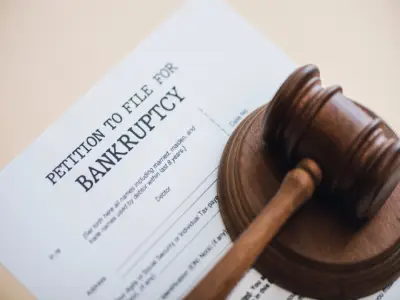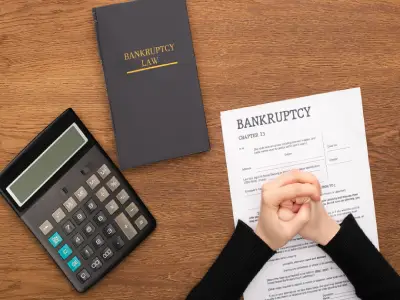Bankruptcy Attorney in Royal Oak, Michigan
Are you an individual who is unfortunately in need of guidance on navigating the complex legalities associated with filing bankruptcy? In the United States, a person can declare bankruptcy in a variety of ways. Individuals who have fallen on hard times and cannot pay their debts may seek the protection of bankruptcy laws. In general, there are two types of individual bankruptcies: Chapter 7 and Chapter 13.
Hammerschmidt Stickradt & Associates is a law firm in Michigan that helps individuals who are considering bankruptcy or have already filed for bankruptcy. If you want more information about who can file for bankruptcy, credit counseling, debtor education, and the processes, contact our Michigan bankruptcy law firm today for a free consultation.
From understanding bankruptcy laws, how to qualify for Chapter 7 and Chapter 13, and should you file for bankruptcy, read on for invaluable tips that will help guide you through turbulent waters!
Bankruptcy Law in the State of Michigan

Generally, the bankruptcy process in Michigan is no different from other states as it works under federal law rather than state regulations. This system enables individuals to reset their debt contracts and have a new beginning by uniting with creditors.
Besides Michigan’s laws, a significant factor in the property you will be able to preserve during your bankruptcy case depends on various filing information. In Michigan, the bankruptcy code recognizes three types of bankruptcies: Chapter 7, Chapter 11, and Chapter 13. But we’ll only discuss Chapter 7 and Chapter 13 only since Chapter 11 is mostly for business bankruptcy.
It is necessary to consult with a qualified bankruptcy attorney in Michigan before making any decisions regarding filing for bankruptcy. Hammerschmidt Stickradt & Associates will assist you with our bankruptcy lawyer in understanding the process and your rights and obligations for you to make a good decision regarding what is beneficial for your financial situation. Contact us today for a free consultation.
What is a Chapter 7 Bankruptcy?
Liquidation bankruptcy is known as Chapter 7 bankruptcy which works by canceling most types of debt while allowing the debtor to protect their property for necessary living and working expenses. Most people can keep all or most of their property, though if they have more than what’s allowed by law, a bankruptcy trustee may sell it and use the proceeds to pay creditors. If a person qualifies for Chapter 7 bankruptcy, they must first pass the means test, which determines whether they can file this type of bankruptcy.
To file for Chapter 7 bankruptcy, you must fulfill specific requirements. For example, you must have little or no disposable income and be unable to repay your debt to your creditor within three to five years. Also, you are prohibited from filing a Chapter 7 or Chapter 13 bankruptcy if it was filed within the previous eight or six years, respectively. The means test will also look at your income and expenses and compare them against the median income in your state. If it is determined that you are earning too much to qualify for Chapter 7, then you won’t be able to file this type of bankruptcy.
If you are granted eligibility for Chapter 7 bankruptcy, all eligible unsecured debt (such as credit card debt) will be wiped out entirely, with no repayment required. Additionally, any secured debts (like mortgages or car loans) remain after the liquidation process has ended. In that case, the court may allow you to keep them while releasing some obligations, such as late fees or penalties incurred before filing for bankruptcy.
What is a Chapter 13 Bankruptcy?
Chapter 13 Bankruptcy allows ordinary wage earners to create a schedule to repay a debt that will pay off some or the entire obligations over 3 to 5 years. The debtor must propose a 3-year payment plan if their monthly income is below the state median unless the court grants them permission to extend the timeline because of exceptional circumstances. It is available to a person with regular sources of income, such as full-time or part-time work, self-employment, Social Security or Disability benefits, or regular pension payments.
To file a Chapter 13 bankruptcy petition, you must have sufficient income to pay your living expenses and enough disposable income left over to make payments toward your debt. Additionally, you must meet certain requirements regarding the amount of secured debt and unsecured debt that you owe.
Once your petition has been filed and approved by the court, you will enter into a repayment plan that outlines how much money you must make a monthly payment in order to satisfy your debt obligations as well as any other necessary payments (such as legal fees). The payment plan usually lasts between three and five years and requires that you make all payments on time and in full. Upon successful completion of the repayment plan, your debts will be forgiven, and you won’t have to pay them again.
It is crucial to remember that filing a Chapter 13 bankruptcy petition does not guarantee success, as numerous factors could ultimately determine whether or not you can complete the repayment plan successfully. Therefore, it is highly recommended that you consult with an experienced bankruptcy attorney before proceeding with this option.
Should I file for bankruptcy?
Filing for bankruptcy has a lot of advantages, particularly when providing much-needed relief from crippling debt, but it’s critical to understand the downsides. Bankruptcy can have a long-term negative impact on your credit report that could take years to repair. Additionally, you may lose valuable assets like your home or car since they could be sold off to pay creditors. In some cases, this could mean losing property like furniture or electronics, which are not protected by law. A bankruptcy will remain on your credit report for several years, which might make it difficult to borrow money or get approved for other things like jobs, insurance, and rentals.
Call our Royal Oak Bankruptcy Attorney Now!
A bankruptcy filing can be a challenging and overwhelming decision, but Hammerschmidt Stickradt & Associates are here to guide and give you legal advice every step of the way. We have years of experience helping clients file for bankruptcy in different situations. We will use every effort to ensure that you understand all your options as well as any potential risks or consequences. Contact us today to learn more about how we can assist you in getting out of debt quickly and efficiently. Get started on making plans to get debt free ASAP! Hammerschmidt Stickradt & Associates is here to address your inquiries and offer assistance during this important process. Call us right away to arrange a free consultation.

